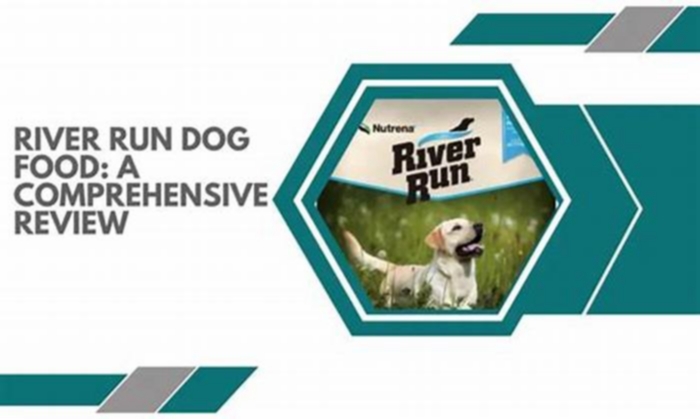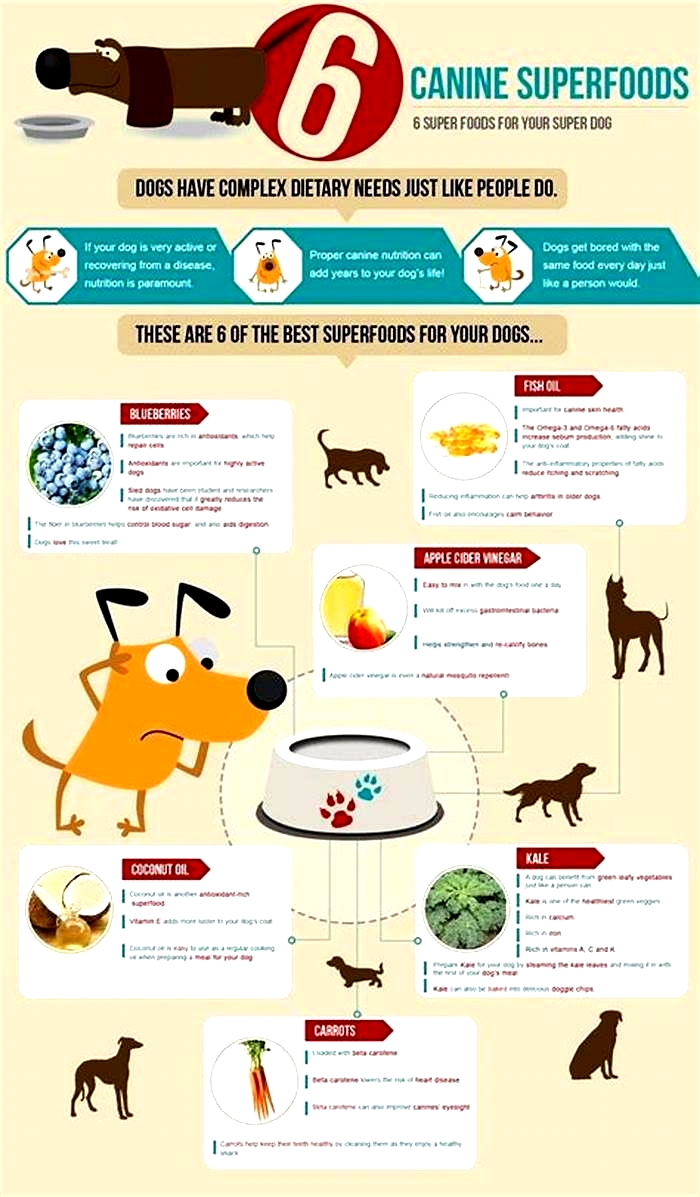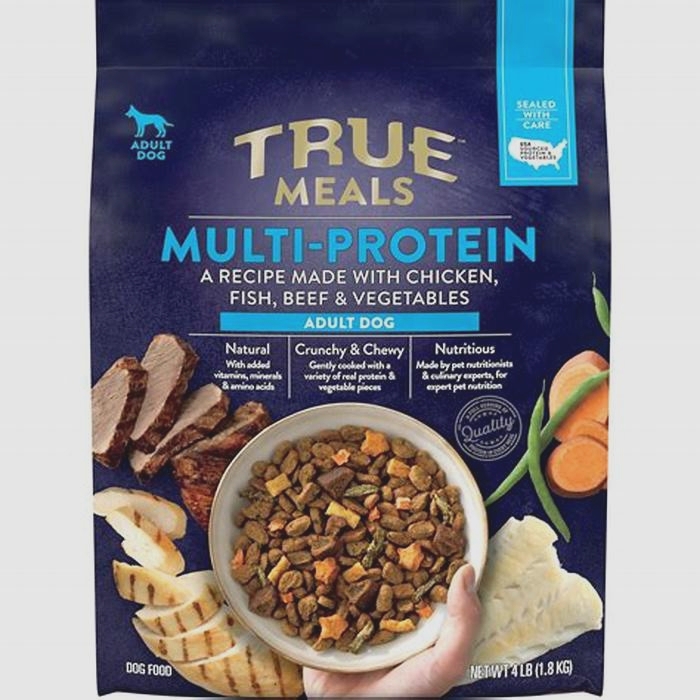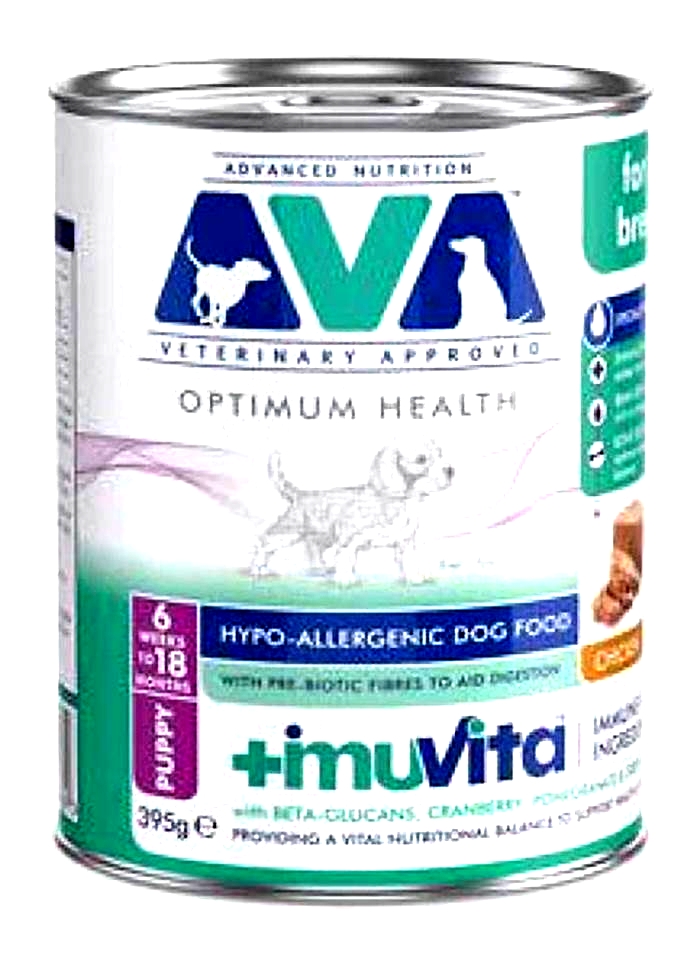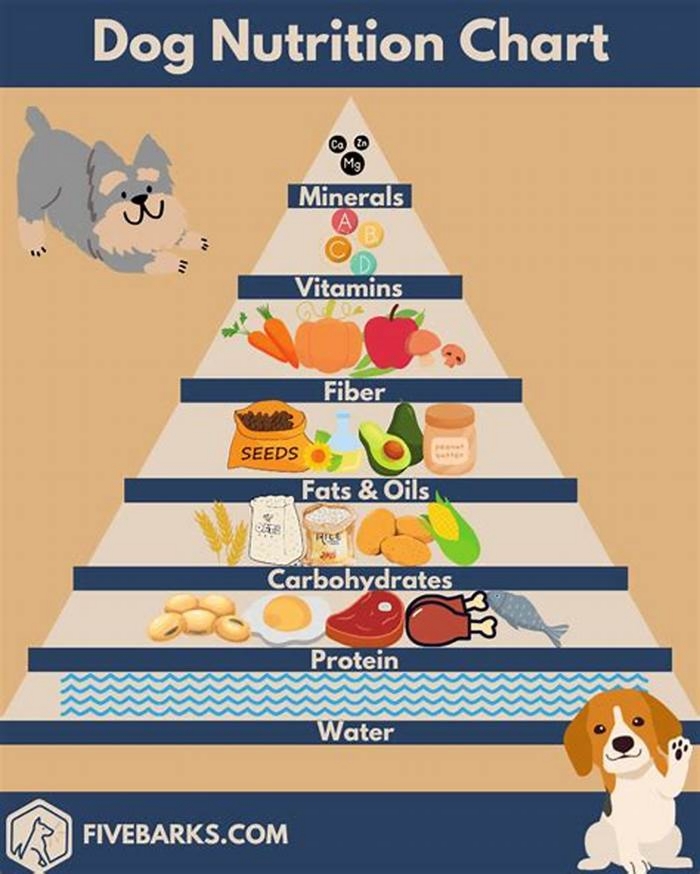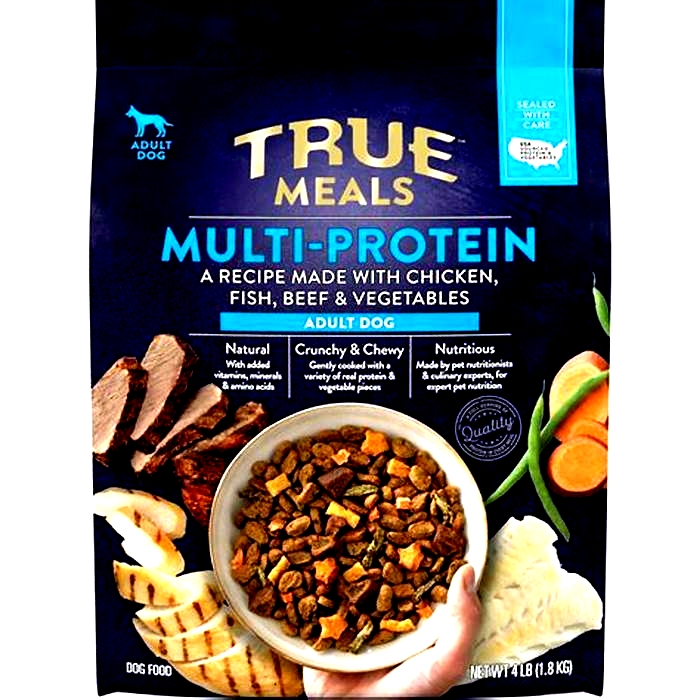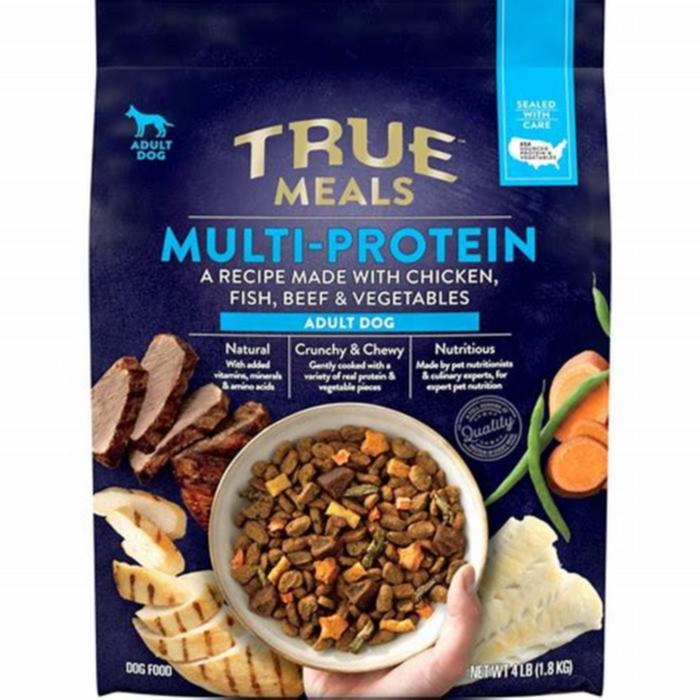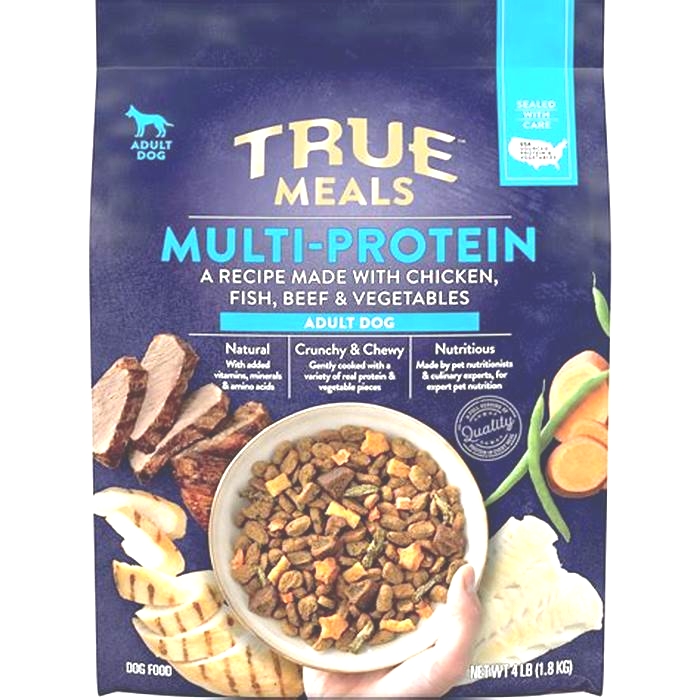Understanding True Meals Dog Food A Comprehensive Guide to Canine Nutrition
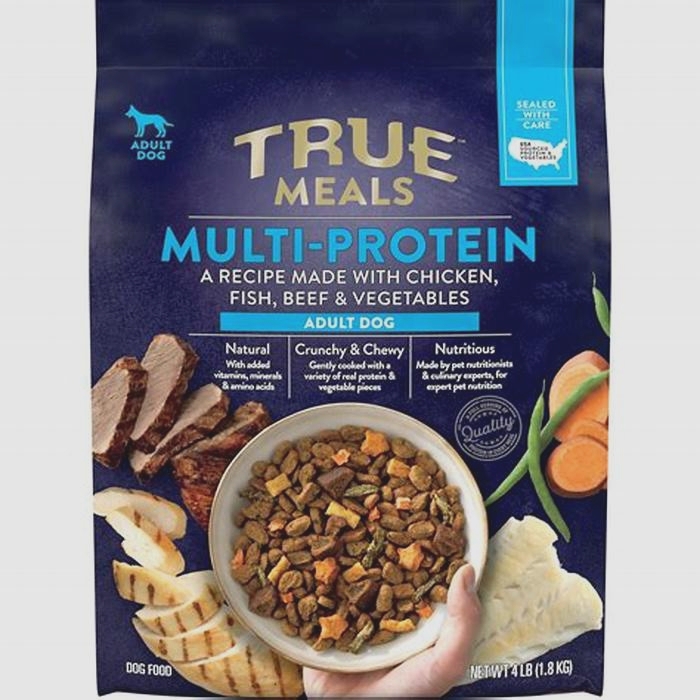
Canine Nutrition: A Comprehensive Guide for Feeding Your Dog
Feeding your dog a well-balanced diet is crucial for their overall health and well-being. As a responsible pet owner, its important to understand the nutritional requirements of dogs at different stages of their lives. This comprehensive guide will provide you with all the information you need to ensure that your furry friend is getting the right nutrients to thrive.
Understanding Your Dogs Nutritional Needs

Dogs as Omnivores
Contrary to popular belief, dogs are not strict carnivores. While they belong to the order Carnivora, their dietary needs have evolved to include a combination of plant and animal foods. Dogs have adapted to an omnivorous diet, meaning they can meet their nutritional requirements by consuming a balanced mix of proteins, fats, carbohydrates, minerals, and vitamins.
Essential Nutrients for Dogs
To keep your dog healthy, its important to provide them with the six essential nutrients they need:
- Water: Dogs require access to fresh, clean water at all times. It accounts for 60 to 70% of their body weight and is crucial for various bodily functions.
- Proteins: Proteins are the building blocks of cells and tissues. They are essential for growth, maintenance, reproduction, and repair. Good sources of proteins for dogs include animal-based meats like chicken, lamb, turkey, beef, fish, and eggs.
- Fats: Fats are a concentrated source of energy and play a crucial role in the structure of cells, hormone production, and vitamin absorption. They also provide insulation and protection for internal organs. Ensure that your dogs diet includes essential fatty acids, such as linoleic acid.
- Carbohydrates: Carbohydrates provide energy and are important for the health of the intestine and reproduction. While dogs dont have a minimum carbohydrate requirement, they need glucose for critical organ function. Moderately fermentable fibers, like beet pulp and brans, can also benefit your dogs gut health.
- Vitamins: Dogs require small amounts of various vitamins for normal metabolic functioning. While a balanced diet should provide most vitamins, consult your veterinarian before supplementing your dogs diet with specific vitamins.
- Minerals: Minerals are essential for bone and teeth health, fluid balance, and metabolic reactions. They must be provided through diet as dogs cannot synthesize them. Ensure that your dogs food contains the necessary minerals for their well-being.
Feeding Your Dog at Different Life Stages

Feeding Puppies
Puppies have specific nutritional requirements to support their rapid growth and development. The weaning process, transitioning them from their mothers milk to solid food, usually begins around three to four weeks of age. Gradually introduce them to puppy food and provide small, frequent meals throughout the day.
As your puppy grows, adjust their food portions to ensure they are getting the right amount of calories. Small breeds often reach their adult size between nine to twelve months, while larger breeds may take longer. Monitor their weight and consult your veterinarian for guidance on feeding schedules and portion sizes.
Feeding Adult Dogs
Adult dogs have different energy requirements based on their size, activity level, and overall health. Its important to feed them a balanced diet that meets their specific needs. Consult with your veterinarian to determine the appropriate amount of food and feeding schedule for your adult dog.
- Advertisement -
To maintain a healthy weight, avoid overfeeding and monitor your dogs body condition score. Regular exercise is also crucial for maintaining your adult dogs overall health and well-being.
Feeding Senior Dogs
As dogs age, their nutritional needs change. Older dogs may experience age-related changes such as deteriorating skin and coat, loss of muscle mass, and decreased immune function. To support their health, its important to provide them with a diet specifically formulated for senior dogs.
Senior dog diets should contain optimal levels of highly digestible protein to maintain muscle mass. Look for foods that include antioxidants like vitamin E and beta-carotene to combat the effects of aging. Additionally, consider incorporating supplements like gamma-linolenic acid (GLA) and fructooligosaccharides (FOS) to support joint health and gut function.
Choosing the Right Dog Food
When it comes to selecting the right dog food, there are a few key factors to consider:
- Quality of Ingredients: Look for dog foods that use real, recognizable, and whole-food ingredients. Avoid foods with fillers and artificial additives.
- Nutritional Content: Check if the dog food meets the guidelines set by the Association of American Feed Control Officials (AAFCO). These guidelines ensure that the food provides the necessary nutrients for your dogs well-being.
- Caloric Content: Consider the caloric density of the food. Feeding guidelines should help you determine the appropriate portion sizes based on your dogs weight, age, and activity level.
- Feeding Schedule: Decide whether portion-control, free-choice, or timed feeding is best for your dog. Consult with your veterinarian to determine the most suitable feeding schedule for your dogs needs.
Managing Your Dogs Weight

Maintaining a healthy weight is crucial for your dogs overall health and longevity. Obesity can lead to various health problems, including diabetes, joint pain, and liver issues. If your dog is overweight, consult with your veterinarian to develop a weight loss plan.
To help manage your dogs weight, consider the following tips:
- Correct Diet: Select a high-quality, calorie-controlled dog food that provides the necessary nutrients without excess calories. Follow your veterinarians recommendations for portion sizes.
- Increase Physical Activity: Regular exercise is essential for weight loss and weight maintenance. Increase your dogs daily activity level to burn more calories and promote overall fitness.
- Modify Behavior: Avoid overfeeding and excessive treats. Stick to a consistent feeding schedule and avoid feeding your dog table scraps or excessive amounts of treats.
Remember to consult with your veterinarian throughout your dogs weight loss journey to ensure their health and well-being.
Conclusion
Feeding your dog a well-balanced diet is essential for their overall health and well-being. Understanding their nutritional needs at different life stages is crucial for providing them with the right nutrients. By selecting high-quality dog food, following appropriate feeding schedules, and monitoring their weight, you can ensure that your furry friend lives a healthy and happy life. Remember to consult with your veterinarian for personalized guidance and recommendations.
Post Views: 102
SPRINGDALE, Ark., June 21, 2021 After a long day of playtime filled with mischief and adventure, your furry friend deserves a meal that is sure to leave them satisfied. Introducing new True Meals Dog Food, a premium dry dog food developed alongside pet nutritionists and culinary experts that delivers the nutrition your dog needs in a texture theyll love, and with a taste they rightfully deserve.
When pet parents are selecting a new food for their dog, its important that they choose an offering that is able to satisfy them through taste, flavor and nutrition, said Monica Bobak, senior brand manager, True Meals Dog Food. True Meals Dog Food features a unique texture that is made from real protein, vegetables and vitamins for a signature taste.
The Nutrition & Taste Your Dog Desires All in One Bag!Dogs are members of the family and they merit a meal that is as robust as those their pet parents consume on a daily basis. True Meals Dog Food features a baked recipe of USA-sourced protein and vegetables, resulting in a signature texture comprised of crunchy and chewy bits that excite dogs tastebuds. Formulated with added vitamins, minerals and amino acids for an optimal balance of nutrients, True Meals Dog Food is a nutritious option for dogs everywhere.
True Meals Dog Food is available in two varieties with specially formulated recipes for puppy, adult, and small dogs:
- Multi Protein (Available for Puppy, Small Dog, Adult Dog): Made with USA-sourced chicken, fish and beef, coupled with a delicious vegetable medley, including sweet potatoes and green beans.
- Chicken Recipe (Available for Adult Dog): Made with USA-sourced chicken and expertly blended with tasty vegetables, such as sweet potatoes and green beans.
True Meals Dog Food can be found at Petco pet care centers nationwide and on Petco.com. For more information on True Meals Dog Food, visit https://www.truechews.com/dog-food/.
###
About True Meals BrandThe True Meals Brand offers a line of premium quality dry dog food that delivers the nutrition your dog needs in a texture theyll love and with a taste they deserve. Made with USA-sourced protein and vegetables with added vitamins, minerals and amino acids for an optimal balance of flavor and nutrients. True Meals Dog Food is produced by Tyson Pet Products, Inc.
CATEGORY: Newsroom
Photos and Captions | |
|---|---|
 Multi-Protein (Puppy, Small Dog, Adult Dog) |  Chicken Recipe (Adult Dog) |
| True Meals Dog Food Multi-Protein is made with real, USA-sourced chicken, fish and beef with a vegetable blend of sweet potatoes and green beans. Available now for Puppy, Small Dog and Adult Dog size varieties at Petco pet care centers nationwide. | True Meals Dog Food Chicken Recipe is made with real, USA-sourced chicken and a vegetable blend of sweet potatoes and green beans. Available now for Adult Dogs at Petco pet care centers nationwide. |
10 Best Dog Food Products: A Comprehensive Guide to Canine Nutrition
Welcoming a canine companion into your life is a joyous experience, and ensuring they receive the right nutrition is paramount for their health and happiness. This comprehensive guide explores the intricacies of feeding your furry friend, covering everything from choosing the10 best dog food products to addressing common feeding challenges.
Choosing the Right Dog Food
Choosing the right dog food is crucial for your furry friends health, happiness, and overall well-being. Heres a curated list of the 10 best dog food products that prioritize quality ingredients, balanced nutrition, and cater to various dietary needs.

- Key Features: Supports overall health, contains real chicken, and includes essential nutrients for a strong immune system.
- Why It Stands Out: Recommended by veterinarians, this formula provides a balanced diet for adult dogs.
- Key Features: High-quality protein sources, real meat as the first ingredient, and a blend of antioxidants.
- Why It Stands Out: Designed to support the immune system and promote a healthy coat and skin.
- Key Features: Specifically formulated for dogs with sensitive stomachs or digestive issues.
- Why It Stands Out: A prescription-grade option for those requiring specialized nutrition.
- Key Features: Real meat as the primary ingredient, with a mix of crunchy kibble and tender shredded pieces.
- Why It Stands Out: Offers a variety of textures for a palatable dining experience.
- Key Features: Grain-free, high-protein formula with a blend of premium ingredients.
- Why It Stands Out: Ideal for dogs with grain sensitivities, promoting overall health and vitality.
- Key Features: Suitable for all life stages, featuring real meat, whole grains, and probiotics.
- Why It Stands Out: A versatile option that can accommodate the nutritional needs of dogs at any age.
- Key Features: Grain-free formula with real deboned salmon as the main ingredient.
- Why It Stands Out: Rich in omega fatty acids, promoting a healthy coat and skin.
- Key Features: Tailored for small and medium-sized breeds, providing a balance of nutrients.
- Why It Stands Out: Supports energy and vitality in smaller dogs with smaller kibble sizes.
- Key Features: Grain-free and crafted with a trio of proteins from chicken, lamb, and salmon.
- Why It Stands Out: A nutrient-dense option for promoting lean muscles and a healthy heart.
- Key Features: Real meat as the main ingredient, with added vitamins and minerals.
- Why It Stands Out: Formulated with simple, natural ingredients, catering to dogs with sensitivities.
When selecting the best dog food for your furry companion, consider factors such as their age, size, breed, and any specific health concerns. Always consult with your veterinarian to ensure you choose a product that aligns with your dogs unique nutritional needs.

Types of Dog Food
Dry Kibble: Dry kibble is a popular and convenient choice. Its cost-effective, has a long shelf life, and supports dental health by promoting chewing.
Wet Food: Wet food, with its higher moisture content, is beneficial for hydration, especially for dogs prone to urinary issues. Its often more palatable for picky eaters.
Raw Food: A raw diet mimics a dogs ancestral eating habits, providing potential benefits like improved coat condition, increased energy, and better dental health. However, careful handling is crucial to prevent bacterial contamination.
Homemade Food: Creating homemade meals allows for customization based on your dogs preferences and dietary needs. It requires a balanced approach, ensuring essential nutrients are included.
Factors to Consider
Age: Puppies, adults, and older pet have varying nutritional needs. Diets should support growth, maintenance, or address aging concerns accordingly.
Breed: Different breeds may have specific dietary requirements. Larger breeds, for instance, might benefit from diets promoting joint health.
Activity Level: Active dogs burn more calories. Adjusting their diet to match their energy expenditure ensures they receive the necessary nutrients.
Health Conditions: Specific health conditions may require specialized diets. Consult with your veterinarian for guidance on managing conditions through nutrition.
Reading Food Labels: Understanding food labels is crucial for making informed choices. Look for named protein sources, avoid artificial additives and fillers, and ensure a balance of essential nutrients.
Establishing a Healthy Feeding Schedule
How Often to Feed Your Dog:
- Puppies: Generally require three to four meals a day.
- Adults: Typically fed twice a day.
- Older: May benefit from smaller, more frequent meals.
Portion Sizes for Different Dogs: Adjust portion sizes based on factors like size, age, and activity level. Regularly monitor your dogs weight to ensure they maintain a healthy balance.
Feeding Times and Routines: Dogs thrive on routine. Establish regular feeding times in a quiet environment to create a positive association with mealtime.
Adjusting Feeding Schedule Based on Needs: Life changes, health conditions, and age-related adjustments may necessitate changes in the feeding schedule. Be adaptable to ensure your dogs evolving needs are met.

Providing Clean Water
Importance of Fresh Water for Dogs: Water is vital for bodily functions, temperature regulation, and overall health. Ensure a constant supply of fresh water, especially in warmer weather.
Choosing the Right Water Bowl: Opt for stainless steel or ceramic bowls to avoid potential allergens from plastic. Regularly clean and disinfect bowls to prevent bacterial growth.
Cleaning and Maintaining Water Bowls: Daily washing and disinfecting prevent bacteria buildup. Inspect bowls for wear and tear, replacing them if needed.
Signs of Dehydration in Dogs: Dry gums, lethargy, and sunken eyes are signs of dehydration. If noticed, seek veterinary attention promptly.
Supplementing Your Dogs Diet:
Benefits of Using Supplements: Supplements can support joint health, coat condition, and address specific health needs. However, consult your vet to avoid unnecessary or excessive supplementation.
Types of Supplements Available: Common supplements include Omega-3 fatty acids, glucosamine, and multivitamins. Choose supplements based on your dogs individual requirements.
Choosing the Right Supplements for Your Dog: Consider factors like age, breed, and health status when selecting supplements. Always consult your veterinarian for personalized recommendations.
Working with Your Veterinarian: Regular vet check-ups are crucial to assess your dogs dietary needs. Discuss any observed changes in behavior or health promptly.
Addressing Common Feeding Challenges:
Dealing with Picky Eaters: Gradual transitions, offering variety, and maintaining consistency can help overcome picky eating habits. If the refusal persists, consult your veterinarian.
Managing Weight Gain or Loss: Adjust portion sizes, monitor treats, and follow vet recommendations for a tailored weight management plan.
Food Allergies and Sensitivities: Observe symptoms like itching, vomiting, or diarrhea. Conduct elimination trials under vet guidance to identify allergens.
Digestive Issues and Dietary Adjustments: Introduce fiber gradually and consider specialized diets under vet supervision for chronic digestive concerns.

Nutrition for Your Dog:
Nutritional Needs of Dogs at Different Life Stages:
- Puppies: Need diets supporting growth and development.
- Adults: Require balanced nutrition for maintenance.
- Older: Benefit from diets addressing aging concerns.
Importance of Balanced Nutrition for Overall Health: Balanced nutrition plays a key role in energy, immunity, and disease prevention. Consult your vet for personalized nutritional plans.
Understanding Essential Nutrients for Dogs:
Protein, Carbohydrates, Fats, Vitamins, Minerals: A balanced combination of these nutrients is crucial for your dogs health. Read labels to identify nutrient sources.
Reading Dog Food Labels and Interpreting Nutritional Information: Understand the AAFCO statement, guaranteed analysis, and ingredient list. Look for named protein sources and avoid harmful additives.
Avoiding Harmful Ingredients in Dog Food: Identify common allergens and fillers. Opt for foods with named protein sources and minimal artificial additives.
Working with a Veterinarian to Create a Personalized Nutrition Plan for Your Dog: Vet input ensures a tailored approach to your dogs nutrition. Regular adjustments can be made based on changes in health or lifestyle.
Feeding Tips and Best Practices:
Transitioning Your Dog to a New Food: Gradual transitions over a week help avoid digestive issues. Seek vet advice for sensitive dogs.
Storing Dog Food Properly: Use airtight containers, store in a cool, dry place, and check expiration dates regularly.
Traveling with Your Dog and Feeding Considerations: Maintain routine, bring familiar food, and prioritize hydration during travel.
Eating Habits to Encourage in Your Dog: Encourage slow eating with puzzle feeders, and monitor for signs of dental issues.
Signs That Your Dog May Need a Change in Diet: Dull coat, digestive issues, or changes in behavior may indicate a need for dietary adjustments. Consult your vet for an assessment.

Specific Dietary Needs:
Feeding Dogs with Allergies or Sensitivities: Identify allergens through elimination trials and choose hypoallergenic diets under vet guidance.
Dietary Considerations for Dogs with Medical Conditions: Consult your vet for specialized diets tailored to manage specific medical conditions. Regular monitoring is essential.
Homemade Dog Food Recipes and Tips: Balancing proteins, carbs, and fats is crucial. Include safe ingredients and avoid harmful foods. Consult your vet for recipe recommendations.
Raw Feeding for Dogs:
Benefits and Risks: Benefits include improved coat condition and energy levels. Risks involve potential bacterial contamination. Consult your vet for guidance.
Vegan and Vegetarian Diets for Dogs: Controversial and requires careful planning to ensure nutritional adequacy. Consult your vet before introducing such diets.
Additional Resources:
A reliable source offering information on nutrition and breed-specific needs. Guidelines for different life stages are provided.
Ensures pet food meets nutritional standards. Understanding AAFCO statements on labels helps make informed choices.
National Research Council Dog Nutrient Requirements:
In-depth insights into canine nutritional needs. A valuable resource for creating balanced and nutritious diets for your furry friend.Navigating the world of canine nutrition is a rewarding journey. By understanding your dogs unique needs and making informed choices, you ensure they lead a healthy, happy, and fulfilling life.
Frequently Asked Questions (FAQ) About Canine Nutrition
Q1: How much should I feed my dog?
A: The recommended feeding amount varies based on factors such as your dogs size, age, activity level, and the specific brand of dog food. Check the packaging for guidelines, and consult your veterinarian for personalized recommendations.
Q2: What is the best type of dog food dry, wet, or raw?
A: The best type of dog food depends on your dogs preferences, dietary needs, and your lifestyle. Dry kibble is convenient, wet food can be more palatable, and raw food mimics a dogs ancestral diet. Consult your vet to determine the most suitable option.
Q3: How often should I feed my dog?
A: Puppies usually require more frequent meals (3-4 times a day), while adults can be fed twice a day. Senior dogs might benefit from smaller, more frequent meals. Establish a consistent feeding schedule and monitor your dogs weight.
Q4: Can I switch my dogs food, and how should I do it?
A: Yes, you can switch your dogs food gradually over 7-10 days to avoid digestive upset. Mix the new food with the old in increasing proportions. If your dog has dietary sensitivities, consult your vet for a specialized transition plan.
Q5: What should I do if my dog is a picky eater?
A: Picky eating can be addressed by offering a variety of flavors, maintaining a consistent feeding schedule, and gradually introducing new foods. If the issue persists, consult your vet to rule out underlying health concerns.
Q6: Are homemade diets safe for dogs?
A: Homemade diets can be safe if they are well-balanced and meet your dogs nutritional needs. Consult your vet to ensure the diet provides the right mix of proteins, carbohydrates, and fats, as well as essential vitamins and minerals.
Q7: Can I give my dog human food as treats?
A: Some human foods are safe as treats, such as plain cooked meats and vegetables. However, avoid foods toxic to dogs, like chocolate and onions. Always check with your vet before introducing new treats to your dogs diet.
Q8: How do I know if my dog has food allergies?
A: Signs of food allergies include itching, vomiting, diarrhea, or skin issues. If you suspect your dog has food allergies, consult your vet. They may recommend an elimination diet to identify the problematic ingredient.
Q9: Should I give my dog supplements?
A: It depends on your dogs individual needs. While a balanced diet should provide essential nutrients, some dogs may benefit from supplements. Consult your vet before introducing any supplements to ensure they are safe and necessary.
Q10: How can I tell if my dog is higherweight or underweight?
A: Feel your dogs ribs. They should be easily felt with a slight covering of fat. An higherweight dog will have difficulty feeling the ribs, while an underweight dogs ribs will be too prominent. Consult your vet for advice on managing your dogs weight.
Remember, these answers are general guidelines, and your dogs specific needs may vary. Always consult with your veterinarian for personalized advice tailored to your dogs unique characteristics and health status.

